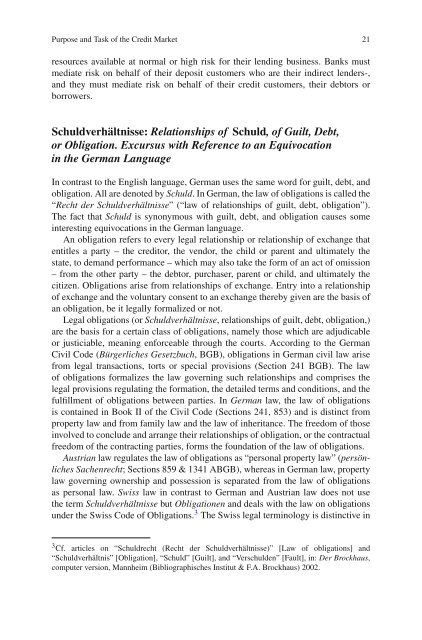The Ethics of Banking: Conclusions from the Financial Crisis (Issues ...
The Ethics of Banking: Conclusions from the Financial Crisis (Issues ...
The Ethics of Banking: Conclusions from the Financial Crisis (Issues ...
You also want an ePaper? Increase the reach of your titles
YUMPU automatically turns print PDFs into web optimized ePapers that Google loves.
Purpose and Task <strong>of</strong> <strong>the</strong> Credit Market 21<br />
resources available at normal or high risk for <strong>the</strong>ir lending business. Banks must<br />
mediate risk on behalf <strong>of</strong> <strong>the</strong>ir deposit customers who are <strong>the</strong>ir indirect lenders-,<br />
and <strong>the</strong>y must mediate risk on behalf <strong>of</strong> <strong>the</strong>ir credit customers, <strong>the</strong>ir debtors or<br />
borrowers.<br />
Schuldverhältnisse: Relationships <strong>of</strong> Schuld, <strong>of</strong> Guilt, Debt,<br />
or Obligation. Excursus with Reference to an Equivocation<br />
in <strong>the</strong> German Language<br />
In contrast to <strong>the</strong> English language, German uses <strong>the</strong> same word for guilt, debt, and<br />
obligation. All are denoted by Schuld. In German, <strong>the</strong> law <strong>of</strong> obligations is called <strong>the</strong><br />
“Recht der Schuldverhältnisse” (“law <strong>of</strong> relationships <strong>of</strong> guilt, debt, obligation”).<br />
<strong>The</strong> fact that Schuld is synonymous with guilt, debt, and obligation causes some<br />
interesting equivocations in <strong>the</strong> German language.<br />
An obligation refers to every legal relationship or relationship <strong>of</strong> exchange that<br />
entitles a party – <strong>the</strong> creditor, <strong>the</strong> vendor, <strong>the</strong> child or parent and ultimately <strong>the</strong><br />
state, to demand performance – which may also take <strong>the</strong> form <strong>of</strong> an act <strong>of</strong> omission<br />
– <strong>from</strong> <strong>the</strong> o<strong>the</strong>r party – <strong>the</strong> debtor, purchaser, parent or child, and ultimately <strong>the</strong><br />
citizen. Obligations arise <strong>from</strong> relationships <strong>of</strong> exchange. Entry into a relationship<br />
<strong>of</strong> exchange and <strong>the</strong> voluntary consent to an exchange <strong>the</strong>reby given are <strong>the</strong> basis <strong>of</strong><br />
an obligation, be it legally formalized or not.<br />
Legal obligations (or Schuldverhältnisse, relationships <strong>of</strong> guilt, debt, obligation,)<br />
are <strong>the</strong> basis for a certain class <strong>of</strong> obligations, namely those which are adjudicable<br />
or justiciable, meaning enforceable through <strong>the</strong> courts. According to <strong>the</strong> German<br />
Civil Code (Bürgerliches Gesetzbuch, BGB), obligations in German civil law arise<br />
<strong>from</strong> legal transactions, torts or special provisions (Section 241 BGB). <strong>The</strong> law<br />
<strong>of</strong> obligations formalizes <strong>the</strong> law governing such relationships and comprises <strong>the</strong><br />
legal provisions regulating <strong>the</strong> formation, <strong>the</strong> detailed terms and conditions, and <strong>the</strong><br />
fulfillment <strong>of</strong> obligations between parties. In German law, <strong>the</strong> law <strong>of</strong> obligations<br />
is contained in Book II <strong>of</strong> <strong>the</strong> Civil Code (Sections 241, 853) and is distinct <strong>from</strong><br />
property law and <strong>from</strong> family law and <strong>the</strong> law <strong>of</strong> inheritance. <strong>The</strong> freedom <strong>of</strong> those<br />
involved to conclude and arrange <strong>the</strong>ir relationships <strong>of</strong> obligation, or <strong>the</strong> contractual<br />
freedom <strong>of</strong> <strong>the</strong> contracting parties, forms <strong>the</strong> foundation <strong>of</strong> <strong>the</strong> law <strong>of</strong> obligations.<br />
Austrian law regulates <strong>the</strong> law <strong>of</strong> obligations as “personal property law” (persönliches<br />
Sachenrecht; Sections 859 & 1341 ABGB), whereas in German law, property<br />
law governing ownership and possession is separated <strong>from</strong> <strong>the</strong> law <strong>of</strong> obligations<br />
as personal law. Swiss law in contrast to German and Austrian law does not use<br />
<strong>the</strong> term Schuldverhältnisse but Obligationen and deals with <strong>the</strong> law on obligations<br />
under <strong>the</strong> Swiss Code <strong>of</strong> Obligations. 3 <strong>The</strong> Swiss legal terminology is distinctive in<br />
3 Cf. articles on “Schuldrecht (Recht der Schuldverhältnisse)” [Law <strong>of</strong> obligations] and<br />
“Schuldverhältnis” [Obligation], “Schuld” [Guilt], and “Verschulden” [Fault], in: Der Brockhaus,<br />
computer version, Mannheim (Bibliographisches Institut & F.A. Brockhaus) 2002.

















